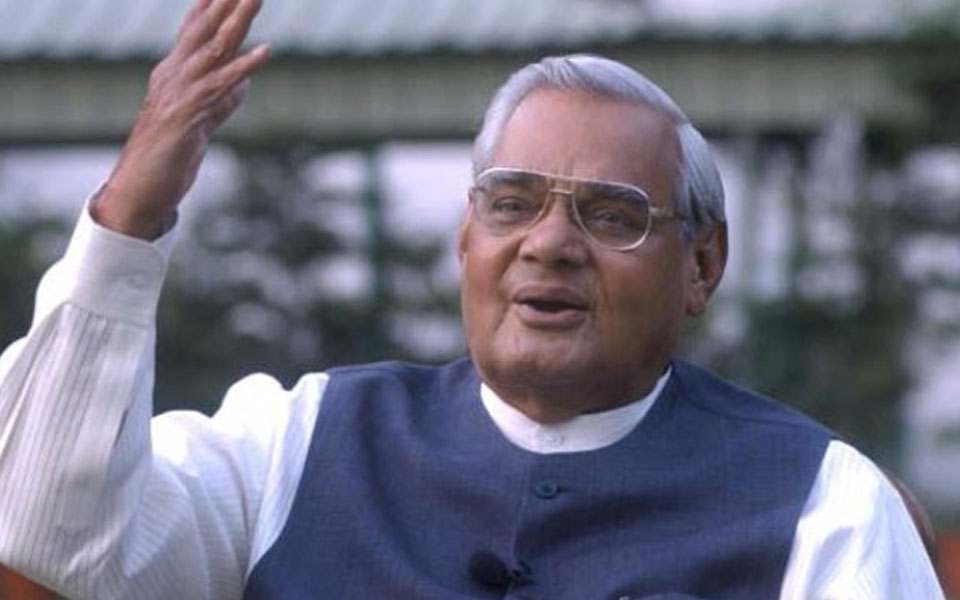New Delhi : Pandit Jawaharlal Nehru and Atal Bihari Vajpayee had quite a few things in common. Both Nehru and Vajpayee were the first leader from their respective parties to become the Prime Minister of India. As incumbent prime minister, Nehru had predicted that Vajpayee would occupy his seat "one day".
Before joining politics, Atal Bihari Vajpayee was a journalist. He worked for newspapers like Rashtra Dharma of RSS ideologue Deendayal Upadhyay, Panchjanya (the RSS mouthpiece in Hindi) and dailies - Veer Arjun and Swadesh.
Four years after becoming an RSS pracharak (full-time worker), Vajpayee got associated with the Bharatiya Jan Sangh (precursor to the BJP) in 1951. He was the political secretary to Syama Prasad Mookerjee, the BJS founder-president, when the latter launched campaign against the government's permit order for entering Jammu and Kashmir.
Atal Bihari Vajpayee was the one to pack the baggage for Mookerjee and saw him off at the Delhi railway station on 8 May 1953 as the BJS leader left on a mission to enter Jammu and Kashmir defying the entry permit order. Mookerjee was arrested on the Jammu and Kashmir border. He was found dead on 23 June in Srinagar jail under mysterious circumstances.
Vajpayee carried Mookerjee's message - "there can't be two law codes (vidhaan), two chiefs (pradhaan) and two symbols (nishaan) - for a bigger agitation to the rank and file of the party. Vajpayee became a full-time member of the BJS in 1953 after Mookerjee's death.
Vajpayee saw a meteoric rise in the BJS, which nominated him as a candidate in 1955 by-election for the Lucknow Lok Sabha seat, which had fallen vacant following resignation of Vijaya Lakshmi Pandit, the sister of Pandit Jawaharlal Nehru. Vajpayee's election campaign was noted for his impressive oratorical skills. He finished third in the bypoll.
Two years later, Vajpayee was nominated from three Lok Sabha seats in the second general elections by the BJS. Vajpayee won from Balrampur, finished runner-up in Lucknow and lost deposit at Mathura. Coming from a small party against the Congress of Pandit Nehru, Vajpayee performed exceptionally well as a debutant parliamentarian.
Vajpayee got the attention of Pandit Nehru with the range of questions that he raised in the Lok Sabha, speeches that he delivered and interventions that he made in the proceedings of the House. His range varied from international developments like German Unification to domestic laws.
Pandit Nehru was so influenced with his eloquence in Hindi that in 1957 he predicted Vajpayee to be the prime minister of India in future. While introducing Vajpayee to a foreign dignitary, Nehru said, "This young man one day will become the country's prime minister." Nehru's prediction came true almost 40 years later in 1990s.
Vajpayee, despite having told Nehru to "have a split personality", had tremendous respect for the first prime minister. When Vajpayee became the external affairs minister in 1977, he returned the favour that Nehru might have done by making "the PM prediction".
As Vajpayee was set to take charge of the external affairs ministry, the bureaucrats got busy with removing all the signs of Congress rule in the office as the Janata Party had won on a huge anti-Indira anti-Congress wave. On entering his office, Vajpayee was quick to notice a blank spot on the wall.
Historian Ramchandra Guha has quoted Vajpayee as telling his secretary, "This is where Panditji's portrait used to be. I remember it from my earlier visits to the room. Where has it gone? I want it back." Pandit Nehru remains the longest-serving foreign minister of India - 17 years.
courtesy : indiatoday.in
Let the Truth be known. If you read VB and like VB, please be a VB Supporter and Help us deliver the Truth to one and all.
Mumbai: A businessman from Powai was allegedly blackmailed by his friend, who demanded ₹80 lakh and sexual favours from his wife. The accused, identified as John Pereira, claimed to possess compromising videos of the businessman and objectionable photos of his wife and her friends.
According to reports, Pereira made WhatsApp calls to threaten the businessman, warning that he would share the images and videos with the victim’s family, friends, and colleagues if his demands were not met. The couple was allegedly harassed for six months, from August 2024 to January 2025.
The businessman eventually approached the police and lodged a complaint at Powai Police Station. A case has been registered under relevant sections of the Bharatiya Nyaya Sanhita (BNS), and the matter has been transferred to DN Nagar Police for further investigation. No arrests have been made so far.





